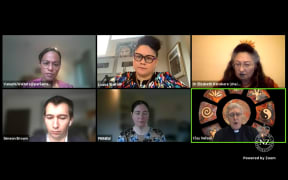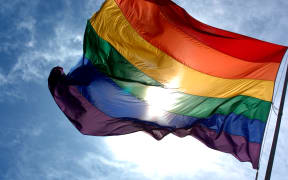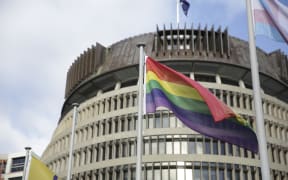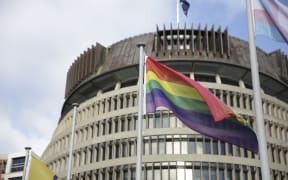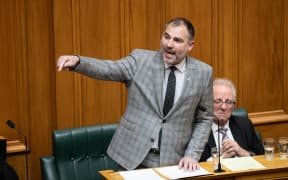The proposed law banning conversion therapy practices is not strong enough, some submitters have argued, and needs work to ensure it will do what it aims to.
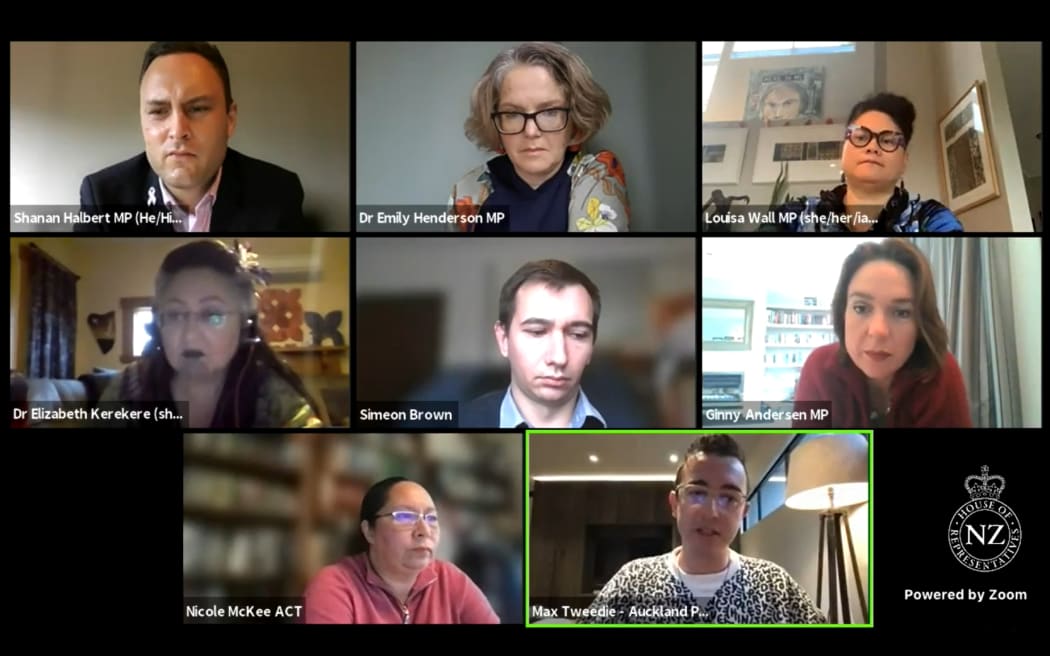
The Justice Select Committee hears a submission from Auckland Pride director Max Tweedie on conversion therapy. Photo: Fair use / Justice Select Committee / Facebook / Screenshot
Consultation closed on 8 September, with more than 100,000 submissions made - a record number - and the Justice Select Committee has yesterday began hearing oral submissions via teleconference.
Conversion therapy involves attempts to change a person's sexual orientation or gender, despite that not being possible, and can cause serious harm.
Churches have expressed a range of views, with some calling for the bill to be scrapped outright and others in firm support.
Video of the submissions is available on the Justice Select Committee Facebook page
Below are some of the most common changes requested by submitters in support of the bill.
Attorney-General signoff
One of the most commonly requested changes was the requirement for any criminal prosecutions under the law to be signed off by the Attorney-General, who is the MP appointed by the government as the Crown's top legal officer.
VicLabour submitter Ryan Hooper-Smith said they were "extremely concerned" at the high bar the requirement would place on the offence.
"While this bill doesn't stop homophobes from telling us to change, it can protect our community from being coerced into a dangerous and disgusting practice.
"Other offences which require attorney-general approval tend to lie around corruption, national security and things of significant interest like that. This bill is about stopping people physically and emotionally destroying the rainbow community. It should be in the unbiased hands of the justice system and police."
"There's also nothing stopping an Attorney-General in 10 to 15 years being close to an organisation which does conversion practices, or a church, and refuse prosecution. I know the A-G position is supposed to be apolitical but politics is ultimately an environment where things can be manipulated.
He said the expectation of a high bar for prosecution could also suppress prosecution by police.
Labour MP Louisa Wall noted that another of the laws covered by Attorney-General signoff was the Oranga Tamariki Act regarding the protection and care of children, and suggested that might be why it had been included in this case.
NZ Law Society submitter Chris Macklin said Attorney-General consent was not common, but not unusual either. The Attorney-General was expected to act on advice, so may not be as susceptible to bias as some might make out.
"More of a policy decision for the government of the day, rather than a decision that's gonna be right or wrong in law. As I say, it's not uncommon, it's something that is grafted on to some offences and it's been around for a very long time and exercised with the usual sort of principles that apply.
"It's one of the many gatekeeping provisions that can be employed."
Definitions: Intention to change or suppress
VUW Rainbow Law Students Society submitters Claire and Natalie suggested changes to the definition of conversion practices in the bill.
As it stands, conversion practice means any practice that:
- (a) is directed towards an individual because of the individual's sexual orientation, gender identity, or gender expression; and
- (b) is performed with the intention of changing or suppressing the individual's sexual orientation, gender identity, or gender expression.
Claire and Natalie said the words suppress, change and intention could be interpreted very narrowly, and called for definitions of those words to be added to the bill.
"This level of vagueness does not allow certainty in the law and can allow for some of those who are doing harmful practices to escape accountability."
The Young Nats supported defining "suppression" too, saying the word had led to some concern about parents being prosecuted.
"This bill needs to ensure that a balance is struck which allows parents to be able to make decisions for their child, but also explicitly prohibiting parents being able to subject their child to conversion practices."
National Collective of Independent Women's Refuges submitters Natalie Thorburn and Cleo Arathoon argued intention should not be included at all.
"Any person of any age can be coerced by another person, and many victims of coercion are simply not equipped to name coercion for what it is," Arathoon said.
"Imagine just for a second that heterosexual people were being targeted by health or religious practitioners, being told that their identities were wrong, or shameful, or sinful and can be fixed so that they can become 'right'.
Thorburn said if health practitioners were to do such a thing, they could avoid prosecution.
"The bill as it currently stands suggests that in that case we're not liable because we didn't intend it and even if we did, that intent probably can't be proven anyway. But the absence of explicit intent on our part, that does not negate the harm that we would have caused to those heterosexuals."
Protecting intersex people
Queer students association UniQ submitter Rosie van Beusekom was one of those who called for intersex people to be included in protections under the bill.
"Intersex is an umbrella term used to describe variations of sex characteristics that may affect internal or external anatomy, chromosomes, hormones, and can manifest in a variety of other differences from peers.
She said medical interventions that aimed to change intersex people were rarely necessary for preservation of life, and in the interest of protecting bodily autonomy these should be explicitly protected against.
Many other groups also supported protections for intersex people, including VUW Rainbow Law Students Society submitters Claire and Natalie.
Labour MP Louisa Wall raised the possibility that concerns about protecting intersex people may be outside the scope of the law, and could be addressed elsewhere.
They rejected that suggestion, saying from consultation with intersex communities they believed intersex people would be affected and including it in the law was an appropriate avenue to protect them.
"We think that there has been a strong call to include them ... they are at this vulnerable position with the way that society treats them at the moment and the level of discrimination they face, we think they are vulnerable to conversion therapy in ... the same way as other groups we're hoping to protect with this bill."
Consent as a defence?
Some submitters called for clause 10, which states consent is not a defence to criminal prosecution under the law, to be removed.
Tony Bracefield, presenting for Sunshine Christian Preschool and Redeemer Grace Presbyterian Church, said they were perplexed about the consent clause, and if someone had asked for advice, you should be able to freely give that advice.
"It's a primary part of our New Zealand bill of rights, it's a primary part of being a person, is to be able to ask for advice."
However, New Zealand Young Nationals submitters Madison Chamberlain and Stephanie-Anne Ross were among many groups who said the clause needed to be retained.
"If consent is given, it's more than likely a result of rejection and external pressures to meet societal norms from friends, family and religious organisations," Ross said.
St Peter's on Willis is one of the oldest Anglican churches in Wellington, and its social justice group submitter Gail Duncan said they believed it was a basic human right that people should be able to be themselves, and strongly supported the introduction of the legislation.
She said the clause ensuring consent to the practices could not be a defence against prosecution should remain, saying history clearly showed it abused in the past, for instance in cases of rape.
Exemptions for medical practitioners and religious expression
One of the clauses in the bill states that "a health service provided by a health practitioner in accordance with the practitioner's scope of practice" is not a conversion practice, and some groups called for this to be removed.
VUW Rainbow law students society submitters Claire and Natalie suggested medical practices exempted by clause 8.1.b should also be required to support or affirm the person's gender identity or sexual orientation.
"As it currently stands, trans and non-binary people are still vulnerable to conversion practices under this exemption."
The bill also rules out some religious expression and being considered a conversion practice:
- Conversion practice does not include: The expression only of a religious principle or belief made to an individual that is not intended to change or suppress the individual's sexual orientation, gender identity, or gender expression.
The clause has caused consternation among church groups, with New Zealand Christian Network submitter Stuart Lange fearing the bill did not distinguish between harmful practices and open ended counselling.
"Those wanting to explore where they're at need the freedom to seek out and receive ... advice and support."
He proposed an additional clause to account for this, but Auckland Pride submitter Max Tweedie said there should not be a religious exemption.
"We do want to make sure that the kind of conversations that a young person might want to have with their youth pastor or youth group - obviously those kind of conversations we don't want to be criminalised and under the legislation we don't think they are.
"But we want to make sure that there are provisions that are still in place so that it still would be illegal under a religious lens to commit conversion practices."
Young Nats submitter Stephanie-Anne Ross said prohibiting conversion practices did not impact on religious freedom.
"Expressing a religious principle or belief has a specific exemption ... allowing for religious organisations to continue to engage in conversations with individuals wishing to discuss their sexuality or gender identity."
That was also a view supported by Salvation Army submitters Ian Gainsford and Ian Hutson, although they did also support adding a clause to make clearer the line between pushing someone towards conversion therapy and having a respectful conversation.
"My suspicion is that other churches have read into the bill things that aren't there," Gainsford said. He said they believed it was still an expression of religious freedom to pray that God would reveal a person's own identity to them.
Law society submitter Paul Rishworth said they did not believe the bill was directed at the sharing of opinions, it was directed at practices, and this could be made clearer.
Burden of proof for 'serious harm' and support for sufferers
Mental Health Foundation submitter Maisie Thursfield was one of those who said the definition of "serious harm", which the law would should be broadened and clarified alongside consultation with rainbow communities to include mental distress, and not restricted to those suffering from diagnosable mental health conditions.
"We think that harm should be addressed subjectively and the process shouldn't place undue burden on the victim to prove that their harm is valid, or revictimise them in that process.
She also recommended that free psychological support also be offered to those who had gone through the process.
Wellington Community Justice Project submitter Claire Downey said they were concerned about support for those who had suffered harm from the practices, and recommended ACC cover be extended to them.
She said they acknowledged the strain on New Zealand's mental health system but steps needed to be taken now to protect people.
Protections for neurodivergent people
Autistic Collaboration Trust member Jorn Bettin called for the bill to protect neurodivergent people.
"We see this bill as a way to make a start on greater levels of inclusion ... the way the bill is worded could be very easily extended to include neurodivergent people."
He said there was more work that needed to be done to create an inclusive culture.
"Society is traumatising us .... we're not being traumatised because we are neurodivergent."

